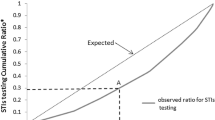Abstract
Background
Dropping out of school/college not only impedes economic prosperity but may also result in poor knowledge and awareness about sexually transmitted diseases (STDs).
Purpose
This study investigated, among young adults in Karachi, Pakistan, the risk factors associated with involuntary school/college dropout and the implications for awareness about HIV/AIDS and STDs.
Method
A population-based, cross-sectional study of 1,650 young males and females, aged 17–21 years and living in Karachi, was conducted using a structured questionnaire. Bivariate and multivariate analyses were performed separately for males and females.
Results
Females were twice as likely to drop out of school/college as males. Furthermore, migrant residential status, living in an extended family and lower socio-economic status were identified as risk factors for school/college dropout both for males and females. In the total sample, only 17% of males and 13% of females had heard of STDs (p = 0.020). Furthermore, 26.8% of males and 20.5% of females had not heard of HIV/AIDS (p = 0.003). The females exhibited a higher level of awareness on these matters than the males, irrespective of whether they had dropped out of school or not. While the males who dropped out were considerably less aware than those who remained at school, there was no such difference among females.
Conclusion
Young adults from poor families are at increased risk of dropping out of school/college. Among the dropouts, males were clearly at risk of ignorance about STDs while females were somewhat better informed.
Similar content being viewed by others
References
Abdelgalil S, Gurgel RG, Theobald S, Cuevas LE. Household and family characteristics of street children in Aracaju, Brazil. Arch Dis Child. 2004;89(9):817–20.
Stevenson W, Maton KI, Teti DM. School importance and dropout among pregnant adolescents. J Adolesc Health. 1998;22(5):376–82.
Chalem E, Mitsuhiro SS, Ferri CP, Barros MC, Guinsburg R, Laranjeira R. Teenage pregnancy: behavioral and socio-demographic profile of an urban Brazilian population. Cad Saude Publica. 2007;23(1):177–86.
Lloyd CB, Mensch BS. Marriage and childbirth as factors in dropping out from school: an analysis of DHS data from sub-Saharan Africa. Popul Stud (Camb). 2008;62(1):1–13.
Tramontina S, Martins S, Michalowski MB, Ketzer CR, Eizirik M, Biederman J, et al. School dropout and conduct disorder in Brazilian elementary school students. Can J Psychiatry. 2001;46(10):941–7.
Obot IS, Hubbard S, Anthony JC. Level of education and injecting drug use among African Americans. Drug Alcohol Depend. 1999;55(1–2):177–82.
McCarty CA, Mason WA, Kosterman R, Hawkins JD, Lengua LJ, McCauley E. Adolescent school failure predicts later depression among girls. J Adolesc Health. 2008;43(2):180–7.
Ma YH, Ding SQ, Wang C. Vulnerability to HIV infection and related health risk behaviors of the out of school adolescents migrated with their parents to Beijing. Biomed Environ Sci. 2008;21(5):404–10.
Asamoah-odei E. Where “being married” may be the greatest risk factor for acquiring HIV. Country focus: Ghana. AIDS Anal Afr. 1996;6(5):4–5.
Population Council Pakistan. Adolescents and Youth in Pakistan: A Nationally Representative Survey. 2001–2002.
Hayward MD, Gorman BK. The long arm of childhood: the influence of early-life social conditions on men's mortality. Demography. 2004;41(1):87–107.
Hussain R. The effect of religious, cultural and social identity on population genetic structure among Muslims in Pakistan. Ann Hum Biol. 2005;32(2):145–53.
Raymo JM. Educational attainment and the transition to first marriage among Japanese women. Demography. 2003;40(1):83–103.
Ananthakrishnan S, Nalini P. Social status of the rural girl child in Tamil Nadu. Indian J Pediatr. 2002;69(7):579–83.
Government of Pakistan. 1998 Census report of Pakistan:Population Census Organization, Statistics Division, Islamabad, Pakistan. 2001.
Ali M, Bhatti MA, Ushijima H. Reproductive health needs of adolescent males in rural Pakistan: an exploratory study. Tohoku J Exp Med. 2004;204(1):17–25.
Kapamadzija A, Bjelica A, Segedi D. Sex knowledge and behavior in male high school students. Med Pregl. 2000;53(11–12):595–9.
National Institute of Population Studies (NIPS) Islamabad Pakistan. Reproductive Health of Youth: Perceptions, Attitudes and Practices. March 2003.
UNAIDS. Report on the global AIDS epidemic. http://www.unaids.org/en/KnowledgeCentre/HIVData/GlobalReport/2008/2008_Global_report.asp Annex 1. 2008 [updated 2008; cited 2009]; Available from.
Government of Sindh Pakistan. Surveillance Data In: Sindh AIDS Control Program. 2004.
Shah SA, Altaf A, Mujeeb SA, Memon A. An outbreak of HIV infection among injection drug users in a small town in Pakistan: potential for national implications. Int J STD AIDS. 2004;15(3):209.
Blum RW. Youth in sub-Saharan Africa. J Adolesc Health. 2007;41(3):230–8.
Government of Pakistan. Pakistan Integrated Household Survey: Federal Bureau of Statistics. 1998-99.
Perreira KM, Harris KM, Lee D. Making it in America: high school completion by immigrant and native youth. Demography. 2006;43(3):511–36.
Obot IS, Anthony JC. School dropout and injecting drug use in a national sample of white non-Hispanic American adults. J Drug Educ. 2000;30(2):145–55.
Mansoor AB, Fungladda W, Kaewkungwal J, Wongwit W. Gender differences in KAP related to HIV/AIDS among freshmen in Afghan universities. Southeast Asian J Trop Med Public Health. 2008;39(3):404–18.
Savaser S. Knowledge and attitudes of high school students about AIDS: a Turkish perspective. Public Health Nurs. 2003;20(1):71–9.
Mensch BS, Ibrahim BL, Lee SM, el-Gibaly O. Gender-role attitudes among Egyptian adolescents. Stud Fam Plann. 2003;34(1):8–18.
Acknowledgements
We sincerely want to thank the participating adolescents for sharing with us the information required for this study, as well as the interviewers who collected the data in a professional manner. This study was supported by grants from SIDA/Sarec, and we are also grateful to the Swedish Institute for support given to the first author.
Author information
Authors and Affiliations
Corresponding author
Rights and permissions
About this article
Cite this article
Farid-ul-Hasnain, S., Krantz, G. Assessing Reasons for School/College Dropout Among Young Adults and Implications for Awareness about STDs and HIV/AIDS: Findings from a Population-Based Study in Karachi, Pakistan. Int.J. Behav. Med. 18, 122–130 (2011). https://doi.org/10.1007/s12529-010-9074-0
Received:
Accepted:
Published:
Issue Date:
DOI: https://doi.org/10.1007/s12529-010-9074-0




